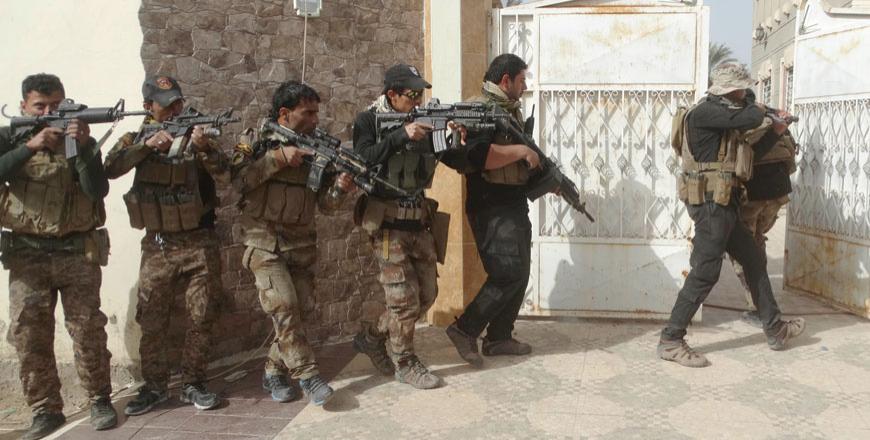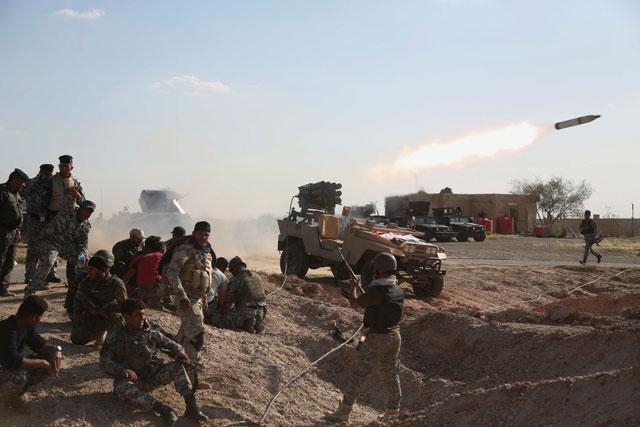You are here
Officials name top suspects in Iraq abductions of Americans
By AP - Jan 21,2016 - Last updated at Jan 21,2016

In this Tuesday photo, Iraqi security forces clear central Ramadi of Daesh militants, 115 kilometres west of Baghdad, Iraq. The Daesh terror group, which controls large parts of Syria and Iraq where it declared a ‘caliphate’ in June 2014, suffered several defeats recently in both countries, including the loss of the Iraqi city of Ramadi and parts of northern and northeastern Syria over the past months (AP photo)
BAGHDAD — Two powerful Shiite militias are top suspects in the abduction of three Americans last weekend in a southern neighbourhood of the Iraqi capital, an Iraqi police commander and a Western security official in Baghdad said Thursday.
The Americans were abducted in Dora, a mixed neighbourhood that is home to both Shiites and Sunnis, on Saturday. It was the latest in a series of brazen high-profile kidnappings undermining confidence in the Iraqi government's ability to control state-sanctioned Shiite militias, which have grown in strength as Iraqi security forces battle the Daesh terror group.
Two Shiite militias — Asaib Ahl Al Haq and Saraya Al Salam — were likely behind the attack, the Iraqi and Western officials told The Associated Press on Thursday.
"Nobody can do anything in that neighbourhood without the approval of those militias," the police commander said. The Western security official confirmed that Iraqi and US intelligence assessments had narrowed down the suspects to those the two groups.
Both officials spoke on condition of anonymity because they were not authorised to talk to reporters.
One of the militias named as a suspect is backed by Iran, a key ally of Iraqi Prime Minister Haider Al Abadi's government.
Abadi said on Thursday that he doubts that there is an Iranian link to the kidnapping, adding "we don't know if they have been kidnapped... they just went missing”.
The US embassy in Baghdad has confirmed that several Americans are missing and said they are working with Iraqi authorities to locate them.
Baghdad authorities said the three Americans were kidnapped from a "suspicious apartment" without elaborating, and have provided no other details. There has been no claim of responsibility.
The identities of the three were not made public and the two officials — the Iraqi commander and the Western official — did not elaborate on the investigation that is underway.
Another Iraqi intelligence official told the AP this week that from the Dora neighbourhood the Americans were taken to Sadr City, a vast and densely populated Shiite district to the east, and there "all communication ceased”.
Lt. Gen. Abdul-Ghani Al Asadi, commander of Iraq’s elite counter-terrorism forces, told AP that his men are aiding in the search effort, which he said is focusing on “certain areas” of the capital Baghdad. He declined to give a more specific location.
Following the dramatic collapse of the Iraqi security forces in the summer of 2014, Shiite militias filled the vacuum, growing more powerful militarily than the country’s own security forces. They are some of the most effective anti-Daesh forces on the ground in Iraq, and also run security in many Baghdad neighbourhoods.
The Iraqi government-allied militias are now officially sanctioned and known as Popular Mobilisation Committees
But many trace their roots to the armed groups that battled US troops after the 2003 invasion and kidnapped and killed Sunnis at the height of Iraq’s sectarian bloodletting in 2006 and 2007. In the fight against Daesh, human rights groups have accused them of abuses targeting Sunni civilians, charges denied by militia leaders.
Asaib Ahl Al Haq, Iranian-backed and one of the most powerful Shiite militias operating in Iraq, has repeatedly spoken out against the presence of US forces in Iraq in the fight against Daesh. Saraya Al Salam is run by Iraq’s influential Shiite cleric Moqtada Al Sadr whose Mehdi militia often battled with US forces between 2003 and 2011.
Abadi has struggled to balance the power and popularity of the Shiite militias with the government’s dependence on the US-led coalition’s contributions to the fight against the Daesh.
Related Articles
BAGHDAD/WASHINGTON — Three US citizens who were kidnapped in Baghdad last month have been released with the help of the Iraqi government, th
Iraqi special forces advanced on central Tikrit on Thursday, backed by US-led coalition planes in the largest offensive yet against Daesh militants holding out in Saddam Hussein's home city.
ERBIL, Iraq —Militias fighting alongside Iraqi troops against the Daesh terror group are committing war crimes using weapons provided to the


















